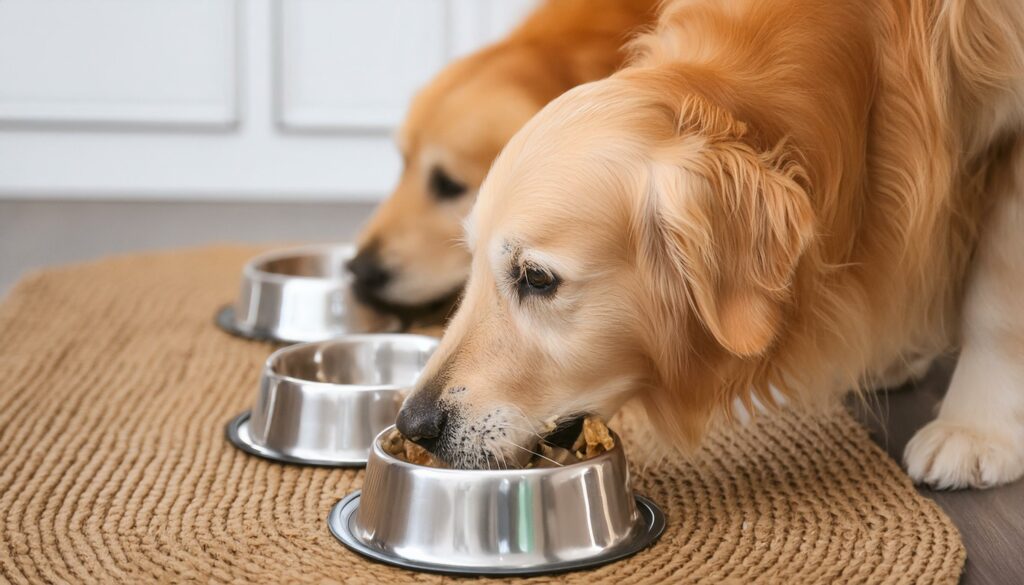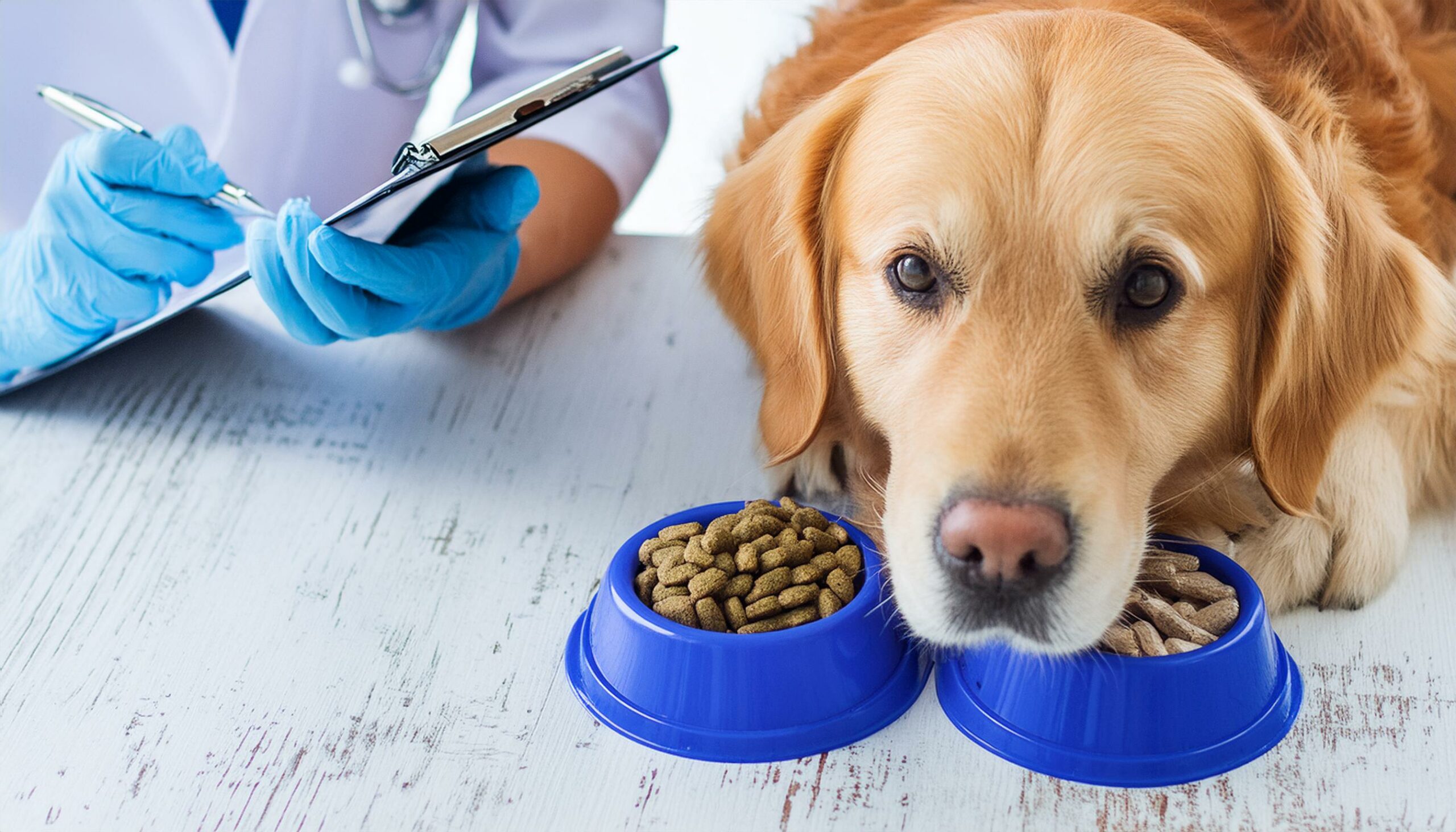Golden Retrievers are renowned for their cheerful demeanor and intelligence. Originally bred as hunting dogs, they have evolved into cherished family pets known for their gentle nature and adaptability. Whether they’re accompanying outdoor adventures or lounging at home, Golden Retrievers thrive on love, attention, and proper nutrition.
Importance of Proper Nutrition
Just like humans, Golden Retrievers require a balanced diet to support their overall health and well-being. A nutritious diet provides them with the energy they need for daily activities, supports their immune system, and promotes healthy growth and development. By prioritizing proper nutrition, you can help your Golden Retriever live a longer, happier life.
Understanding Golden Retrievers’ Nutritional Needs
Essential Nutrients
Golden Retrievers require a variety of essential nutrients to thrive, including protein, carbohydrates, fats, vitamins, and minerals. Protein is essential for muscle development and repair, while carbohydrates provide a source of energy. Fats are important for maintaining healthy skin and coat, as well as supporting various bodily functions. Additionally, vitamins and minerals play crucial roles in metabolism, bone health, and immune function.
Caloric Requirements
The caloric needs of Golden Retrievers vary depending on factors such as age, weight, activity level, and metabolism. Typically, adult Golden Retrievers require between 1,200 to 1,600 calories per day, while puppies and highly active dogs may need more. It’s important to adjust their food intake accordingly to prevent obesity or undernourishment.
Types of Food Suitable for Golden Retrievers

When it comes to feeding your Golden Retriever, there are several options to consider:
Commercial Dog Food
High-quality commercial dog food brands offer complete and balanced nutrition for Golden Retrievers. Look for formulas specifically designed for large breeds or all life stages. These foods are formulated to meet the nutritional needs of dogs and often contain a balance of protein, carbohydrates, fats, vitamins, and minerals.
Raw Diet
Some owners opt for a raw diet consisting of raw meat, bones, fruits, and vegetables. Proponents of raw feeding believe it closely mimics the diet of wild dogs and provides natural nutrients. However, it’s important to consult with a veterinarian or veterinary nutritionist before transitioning your Golden Retriever to a raw diet. Raw feeding requires careful planning to ensure nutritional adequacy and minimize the risk of bacterial contamination.
Homemade Food
Preparing homemade meals allows you to control the ingredients and quality of your Golden Retriever’s food. Many owners prefer this option as it gives them peace of mind knowing exactly what goes into their dog’s meals. However, it’s essential to work with a veterinary nutritionist to formulate a balanced diet that meets your dog’s nutritional needs. Homemade diets may require additional supplementation to ensure they are complete and balanced.
Choosing the Right Food for Your Golden Retriever
Reading Labels
When selecting commercial dog food, it’s important to read the labels carefully. Look for products that list a named meat source as the first ingredient, such as chicken, beef, or lamb. Avoid foods that contain fillers, by-products, or artificial additives. Additionally, choose foods that are appropriate for your dog’s age, size, and activity level.
Consulting with a Veterinarian
Your veterinarian is an invaluable resource when it comes to choosing the right food for your Golden Retriever. They can provide personalized recommendations based on your dog’s individual needs and health status. If you have any questions or concerns about your dog’s diet, don’t hesitate to reach out to your veterinarian for guidance.
Foods to Avoid
While many foods are safe and healthy for Golden Retrievers, there are some items that should be avoided:
- Chocolate: Contains theobromine, which is toxic to dogs.
- Grapes and raisins: Can cause kidney failure in dogs.
- Onions and garlic: Contains compounds that can damage red blood cells.
- Xylitol: An artificial sweetener found in sugar-free gum and other products, which is toxic to dogs.
- Fatty foods: Can cause gastrointestinal upset and pancreatitis in dogs.
- Bones: Can splinter and cause choking or gastrointestinal obstruction.
It’s important to keep these foods out of your Golden Retriever’s reach and never feed them intentionally.
Feeding Schedule and Portion Control
Establishing a regular feeding schedule and practicing portion control are key components of maintaining your Golden Retriever’s health. Divide their daily food allowance into two or three meals and avoid free-feeding, where food is available at all times. This helps prevent overeating and obesity, as well as promotes healthy eating habits.
Special Considerations for Golden Retriever Puppies
Golden Retriever puppies have unique nutritional needs to support their rapid growth and development. They require a diet that is rich in protein, fat, vitamins, and minerals to fuel their growing bodies. Puppies should be fed a puppy-formulated diet until they reach maturity, typically around one year of age. Additionally, puppies may need to be fed more frequently than adult dogs to meet their energy requirements.
Special Dietary Needs for Senior Golden Retrievers
As Golden Retrievers age, their metabolism slows down, and they may become less active. Senior dogs also have different nutritional requirements than younger dogs. To support their aging bodies, switch to a senior-formulated diet that is lower in calories and contains ingredients that promote joint health and cognitive function. Senior dogs may also benefit from additional supplementation, such as glucosamine and chondroitin for joint support.
Addressing Common Health Issues through Nutrition
Certain health issues, such as hip dysplasia, allergies, or digestive problems, may be managed or alleviated through dietary modifications. For example, dogs with food allergies may benefit from a hypoallergenic diet that eliminates common allergens such as beef, chicken, wheat, and soy. Similarly, dogs with sensitive stomachs may benefit from a diet that is easy to digest and free from artificial additives.
Hydration Importance
Proper hydration is essential for your Golden Retriever’s overall health and well-being. Ensure they have access to fresh, clean water at all times, especially during hot weather or after vigorous exercise. Monitor their water intake and encourage them to drink regularly to prevent dehydration and support proper kidney function.
Supplements for Golden Retrievers
While a balanced diet should provide all the nutrients your Golden Retriever needs, certain supplements may be beneficial in certain situations. For example, omega-3 fatty acids can help support healthy skin and coat, while glucosamine and chondroitin can help maintain joint health, particularly in senior dogs or those with arthritis. However, it’s important to consult with your veterinarian before adding any supplements to your dog’s diet to ensure they are safe and appropriate.
Monitoring Your Golden Retriever’s Weight and Health

Regularly monitoring your Golden Retriever’s weight and body condition score is important for identifying any changes in their health. Aim to maintain a healthy body condition score, where you can easily feel their ribs without them being visible. If you notice any significant changes in your dog’s weight or appetite, consult with your veterinarian to rule out any underlying health issues.
Transitioning to a New Diet
When transitioning your Golden Retriever to a new diet, do so gradually over the course of several days to minimize digestive upset.
Start by mixing a small amount of the new food with their current food and gradually increase the ratio over time. Monitor your dog for any signs of gastrointestinal upset, such as vomiting or diarrhea, and adjust the transition period as needed.
Conclusion: Providing the Best Nutrition for Your Golden Retriever
In conclusion, feeding your Golden Retriever a balanced diet that meets their nutritional needs is essential for their health and well-being. Whether you choose commercial dog food, a raw diet, or homemade meals, prioritize quality ingredients and consult with your veterinarian for personalized recommendations. By providing your Golden Retriever with proper nutrition, you can ensure they live a long, happy, and healthy life by your side.
FAQs
How often should I feed my Golden Retriever?
Adult Golden Retrievers typically require two meals per day, while puppies may need three or four meals. Follow your veterinarian’s recommendations based on your dog’s age, weight, and activity level.
Can I give my Golden Retriever human food?
While some human foods are safe for Golden Retrievers in moderation, others can be harmful or toxic. Avoid feeding them chocolate, grapes, onions, garlic, and foods high in fat or sodium.
What should I do if my Golden Retriever is overweight?
If your Golden Retriever is overweight, consult with your veterinarian to develop a weight loss plan tailored to their needs. This may include adjusting their diet, increasing exercise, and monitoring their progress regularly.
Are there any dietary supplements I should give my Golden Retriever?
Certain dietary supplements, such as omega-3 fatty acids or joint supplements, may benefit Golden Retrievers, especially those with specific health issues. However, always consult with your veterinarian before adding any supplements to their diet.
How can I tell if my Golden Retriever is allergic to their food?
Signs of food allergies in Golden Retrievers may include itching, redness, ear infections, gastrointestinal upset, or excessive licking. If you suspect your dog has a food allergy, consult with your veterinarian to identify and eliminate the trigger from their diet.
